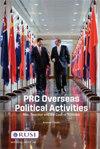Conclusion: Deterrence, Defence and Dialogue
Q4 Social Sciences
引用次数: 0
Abstract
Transatlantic Unity NATO, the most successful military alliance in recent history, can only succeed if it appreciates and, to the extent possible, responds to the concerns of all its members. The principle of solidarity lies at the heart of NATO’s founding treaty. As enshrined in Article 5 of the Washington Treaty, it remains the enduring principle that binds NATO’s members together, committing them to protect and help each other. At the Brussels Summit in July 2018, all 29 members re-emphasised this unwavering responsibility: ‘Any attack against one Ally will be regarded as an attack against us all’. That principle of solidarity also requires each member to take primary responsibility for its own territorial integrity and the security of its immediate region; Article 3 states that allies ‘will maintain and develop their individual and collective capacity to resist armed attack’. Article 3 underscores the principle of fair burden-sharing; investment in national defence is the basis for Article 5. This Whitehall Paper has focused on NATO’s northern region, arguing that Russia’s military build-up constitutes the most important politico-military challenge to the defence of Europe today and in the foreseeable future. Russia’s new order of battle – augmented by high commands optimised for short-notice readiness and prompt mobilisation – manifests itself in a theatre-scale warfare posture and an anti-access strategy that enables Russia to strike any location in Europe and project force far into the North Atlantic with precision and lethality. The authors of the chapters comprising this volume argue that Northern Europe can contain and counter Russia if the region stands together with its North American allies结论:威慑、防御和对话
跨大西洋团结北约是近代史上最成功的军事联盟,只有在它赞赏并尽可能回应其所有成员国的关切的情况下,它才能取得成功。团结原则是北约创始条约的核心。正如《华盛顿条约》第5条所载,它仍然是将北约成员国联系在一起的持久原则,承诺相互保护和帮助。在2018年7月的布鲁塞尔峰会上,所有29个成员国都再次强调了这一坚定不移的责任:“任何针对一个盟友的攻击都将被视为对我们所有人的攻击”。这一团结原则还要求每个成员对自己的领土完整和邻近地区的安全承担主要责任;第3条规定,盟国“将保持和发展其抵抗武装袭击的个人和集体能力”。第3条强调公平分担负担的原则;国防投资是第五条的基础。这份白厅文件聚焦于北约北部地区,认为俄罗斯的军事集结是当今和可预见的未来对欧洲防务最重要的政治军事挑战。俄罗斯的新作战秩序——通过针对短时间通知准备和快速动员而优化的高级指挥部得到了加强——体现在战区规模的作战态势和反进入战略中,使俄罗斯能够打击欧洲的任何地点,并以精确和致命的方式将部队投射到北大西洋。本卷各章的作者认为,如果该地区与北美盟友站在一起,北欧可以遏制和对抗俄罗斯
本文章由计算机程序翻译,如有差异,请以英文原文为准。
求助全文
约1分钟内获得全文
求助全文
来源期刊

Whitehall Papers
Social Sciences-Archeology
自引率
0.00%
发文量
12
期刊介绍:
The Whitehall Paper series provides in-depth studies of specific developments, issues or themes in the field of national and international defence and security. Published three times a year, Whitehall Papers reflect the highest standards of original research and analysis, and are invaluable background material for policy-makers and specialists alike.
 求助内容:
求助内容: 应助结果提醒方式:
应助结果提醒方式:


